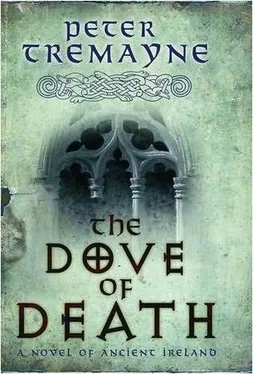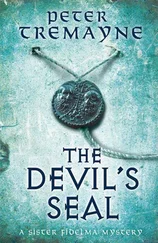Peter Tremayne - The Dove of Death
Здесь есть возможность читать онлайн «Peter Tremayne - The Dove of Death» весь текст электронной книги совершенно бесплатно (целиком полную версию без сокращений). В некоторых случаях можно слушать аудио, скачать через торрент в формате fb2 и присутствует краткое содержание. Жанр: Исторический детектив, на английском языке. Описание произведения, (предисловие) а так же отзывы посетителей доступны на портале библиотеки ЛибКат.
- Название:The Dove of Death
- Автор:
- Жанр:
- Год:неизвестен
- ISBN:нет данных
- Рейтинг книги:5 / 5. Голосов: 1
-
Избранное:Добавить в избранное
- Отзывы:
-
Ваша оценка:
- 100
- 1
- 2
- 3
- 4
- 5
The Dove of Death: краткое содержание, описание и аннотация
Предлагаем к чтению аннотацию, описание, краткое содержание или предисловие (зависит от того, что написал сам автор книги «The Dove of Death»). Если вы не нашли необходимую информацию о книге — напишите в комментариях, мы постараемся отыскать её.
The Dove of Death — читать онлайн бесплатно полную книгу (весь текст) целиком
Ниже представлен текст книги, разбитый по страницам. Система сохранения места последней прочитанной страницы, позволяет с удобством читать онлайн бесплатно книгу «The Dove of Death», без необходимости каждый раз заново искать на чём Вы остановились. Поставьте закладку, и сможете в любой момент перейти на страницу, на которой закончили чтение.
Интервал:
Закладка:
‘He was born in the year when the great general of the Britons called Arthur defeated the Saxons at Badon Hill, on whose slopes nearly a thousand Saxon princes were said to have been slaughtered.’
Eadulf stirred uncomfortably but he had often heard the stories from his own people of how they wrested control of the lands from the Britons and slaughtered them. He could not protest at hearing the story as seen from another viewpoint.
‘That was about a century and a half ago. Then there were two decades of peace between the two peoples before that black day at Camlann when Arthur was slain. After that, the Saxons began to move westward again and Gildas and many other refugees fled here. He took sanctuary on the sister island to this.’
‘The sister island?’ queried Fidelma, stirring herself from her thoughts about the sea raiders that had been occupying her all day. She tried to concentrate on the conversation.
‘The island of Houad. It means “the duck” and this island is called “little duck”. Houad is a slightly larger island than this, just to the north-west. Gildas lived and worked there until the Prince of Bro-Waroch invited him to cross to the mainland, to the Rhuis peninsula, and establish a community there. It was there he wrote his famous work on the ruin and conquest of Britain.’
‘ De Excidio et Conquestu Britanniae ,’ muttered Fidelma, surprising both Eadulf and Brother Metellus. ‘I have read it. There is a copy in the great scriptorium in the abbey at Menevia in Dyfed. I read it when I was there.’ Then, glancing at Eadulf, she added: ‘As I recall, he blamed several of the kings of the Britons and clergy for their squabbling which allowed the Saxons to conquer the country. Didn’t Gildas believe that the Angles and Saxons were sent to Britain as instruments of God’s wrath?’
‘I also took the opportunity of reading that book while I was in the abbey,’ Brother Metellus responded. ‘It is obvious that you know the work, Fidelma of Cashel. It is true that after this general called Arthur was killed, there was no one strong enough to unite the Britons against the Saxons,’ he conceded. ‘They quarrelled among themselves. Gildas likened the Britons to the Israelites, God’s chosen people, who lost their faith and so were to be punished by God. He called on the prophecies of Jeremiah to foretell a bleak outlook for his people unless the Britons turned aside from their immoral course. He was a man of asceticism and fervour. Of course, there are other great works of Gildas, which they have at the abbey — like his letters on pastoral questions and the reform of the Church and his work on penance…Your own Columbanus admired his work and spoke of him as Gildas Sapiens — Gildas the Wise.’
‘So this Gildas founded an abbey here?’ prompted Eadulf.
‘On the peninsula called Rhuis.’
‘And that is where he died?’
‘No, he did not die there but decided, after a while, to return to Houad. It is there that he died about a century ago. His body was taken back to the abbey and he is buried behind the high altar.’
‘Is it a large abbey?’
‘There are about fifty souls in the community.’
‘Is it a conhospitae , a mixed house?’
Brother Metellus shook his head, slightly scandalised. ‘I am told it used to be, but when Abbot Maelcar took over, he introduced the Rule of Benedict. When I joined the abbey, the community was all committed to a life of celibacy.’
‘And this Abbot…Abbot Maelcar, you said?’
‘Abbot Maelcar, indeed. He is a man of Bro-Waroch.’
‘I know little of this land of Bro-Waroch,’ Eadulf said, ‘yet I am confused. Some seem to call it Bro-Erech and some Bro-Waroch. Which is the correct name, and is it a large kingdom?’
‘From the time of King Alain’s father it has been called Bro-Waroch and it is, indeed, a large kingdom. I heard its history from people as I travelled through it. The earliest settlers from Britain had to regain some of the territory to drive the Frankish incursions back to the east. They say it was Caradog Freichfras of Gwent who founded the kingdom.’ Brother Metellus sniffed in disapproval before continuing. ‘The people, being frontiersmen continually fighting for their existence against the Franks, became a tough and vicious lot. Harsh lives make harsh morals. So it was for the first century of its existence as a kingdom. That left its mark on the lines of the kings. Canao, for example, killed three of his brothers to claim the kingdom. I am told that he died sixty years ago.’
‘What or who is this Waroch, then?’
‘He was an earlier King than Canao. After Canao died, his one surviving brother, Macliau, became King — and when he died, his son, another Canao, became King. Then he died and Judicael of Domnonia claimed the kingdom. In fact, Judicael claimed kingship of all the Bretons and also descent from Waroch. So he named the kingdom as Bro-Waroch, the country of Waroch.’
‘I thought Alain Hir was King of the Bretons?’ Fidelma said.
‘He is the son of Judicael,’ Brother Metellus confirmed. ‘Judicael died about ten years ago, but it was he who merged the two kingdoms of Domnonia and Bro-Warwoch into one.’
‘You sound disapproving?’
‘I am a Roman. It matters not to me the machinations of these kings. I care only for the souls of the people. Meanwhile I am content with the simple life I lead. Alain Hir is a good King, so far as kings go.’
Fidelma smiled slightly. ‘If you have so little time for kings, perhaps you have little time for authority — hence your problem with your Abbot?’
‘Not so.’ Brother Metellus grimaced sourly. ‘Kings are, perhaps, a necessary evil. Before my own people sank into the stupidity of emperors, they had a good system — res publica , “affairs of the public”. Every year the people elected consuls from the Senate to rule them.’
‘And who were the people who comprised the comitia centuriata who elected the consuls, my Roman friend?’ Fidelma asked sweetly.
Brother Metellus stared at her in surprise. ‘Why, the citizens of Rome.’
‘But wealth governed a man’s ability to be part of this Roman democracy,’ countered Fidelma. ‘As the vote had to be made in Rome itself, the rural people never had a chance to participate. What’s more, the rich always voted first and separately — and as the declaration of the result was made on a simple majority as soon as the first section voted, the poor hardly ever voted at all. And consuls could only be chosen from the Senate, whose membership for life was already made from those patrician families. No citizen was free to address that assembly without the consent of the magistrates and tribunes, and they alone had the right to debate matters.’
Brother Metellus’ surprise turned into an expression of amazement. Fidelma felt moved to explain.
‘I spent a period in Rome and occupied my time — well, some of it, that is — in studying some of your legal texts, ancient as well as modern.’
‘You are saying that you believe our imperial system was better?’ queried the Roman.
‘Not at all. In fact, there were faults with both systems. Who your father was and what wealth he had acquired should be no gauge of your own ability.’
‘Yet you are the sister of a king,’ Brother Metellus pointed out, meaningfully.
Fidelma shrugged as if it were of no consequence.
‘Presumably you were the daughter of a king as well?’ he pressed.
‘It so happened that my father, Failbe Flann, was indeed a king. He died when I was a small child.’
‘So your brother succeeded him? Where is the merit in that?’
She tried to explain. ‘That is not how kings are chosen in my land. Our system also relies on who is most able in the family — man or woman — to be head of the family and assume the role of King. During a king’s lifetime, the derbhfine of the family have to meet and elect from their number the successor. They could be sons, brothers or cousins. My brother was the fourth ruler since the death of our father, chosen only after thirty years had passed and he had grown to manhood. No one who is not of mature age and reason can be a king.’
Читать дальшеИнтервал:
Закладка:
Похожие книги на «The Dove of Death»
Представляем Вашему вниманию похожие книги на «The Dove of Death» списком для выбора. Мы отобрали схожую по названию и смыслу литературу в надежде предоставить читателям больше вариантов отыскать новые, интересные, ещё непрочитанные произведения.
Обсуждение, отзывы о книге «The Dove of Death» и просто собственные мнения читателей. Оставьте ваши комментарии, напишите, что Вы думаете о произведении, его смысле или главных героях. Укажите что конкретно понравилось, а что нет, и почему Вы так считаете.











